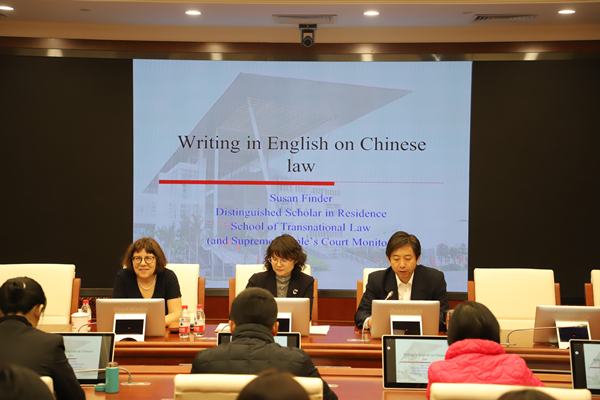Susan Finder, SPC International Commercial Expert Committee Member Spoke at the Intellectual Property Court of the Supreme People's Court

Susan Finder (L1), a member of the SPC International Commercial Expert Committee and a distinguished scholar at the School of Transnational Law of Peking University, gives a lecture themed "Writing in English on Chinese Law" at the Intellectual Property Court of the Supreme People's Court on March 22, 2019. [Photo/enipc.kfyzwh.com]
Susan Finder, SPC International Commercial Expert Committee member, and Distinguished Scholar in Residence at the School of Transnational Law of Peking University delivered a lecture on March 22, 2019 entitled “Writing in English on Chinese Law”.
Zhou Xiang, deputy chief judge of the Intellectual Property Court, presided and Shen Hongyu, presiding judge of the second collegiate panel of the court, provided comments. It was the 17th in the lecture series held by the court.
Professor Finder shared her experience in observing Chinese legal system and in running her blog titled "Supreme People's Court Monitor".
She advised that the Intellectual Property Court's English website should bridge between China's judiciary and international society by publishing more news and events on judicial protection of intellectual property rights.
In her lecture, Professor Finder introduced skills needed for writing well in English, highlighting the reading habits of English audience, the importance of choosing an appealing title, characteristics of internet writing, differences between Chinese writing and English writing, online resources for legal English writing, large scale organization, peer advice and self-editing, and so on.
She suggested that an English article should go to the point, give the author's thesis in the first paragraph, and have a topic sentence in each paragraph, and be clearly written, easy to understand, and retain the audience's interest.
She illustrated her points on how to avoid common mistakes made by Chinese writers writing professionally in English by asking the audience to analyze an article written by a partner at a leading Chinese law firm.
Professor Finder's lecture is the second in the series of English lectures held by the Foreign Language Training Team of the Intellectual Property Court.
Judges, judge assistants, and clerks from the court actively participated in the lecture and were fully involved discussion, which showed their passion and excellent English language skills.
Shen summarized the content of the lecture as "W.T.O." (Who and What, Title, Optimization), that is, targeting your audience and explicitly expressing your opinion; choosing a title that persuades people to read it, frame people's thinking and help readers remember it; optimizing the content, key words, summary, etc. to match search terms used by the target audience.
Shen, on behalf of the Intellectual Property Court, appreciated Professor Finder's contribution and invited her to further cooperate with the court.
This lecture also attracted participants from the Beijing Internet Court and Patent Examination Cooperation (Beijing) Center of the Patent Office.
